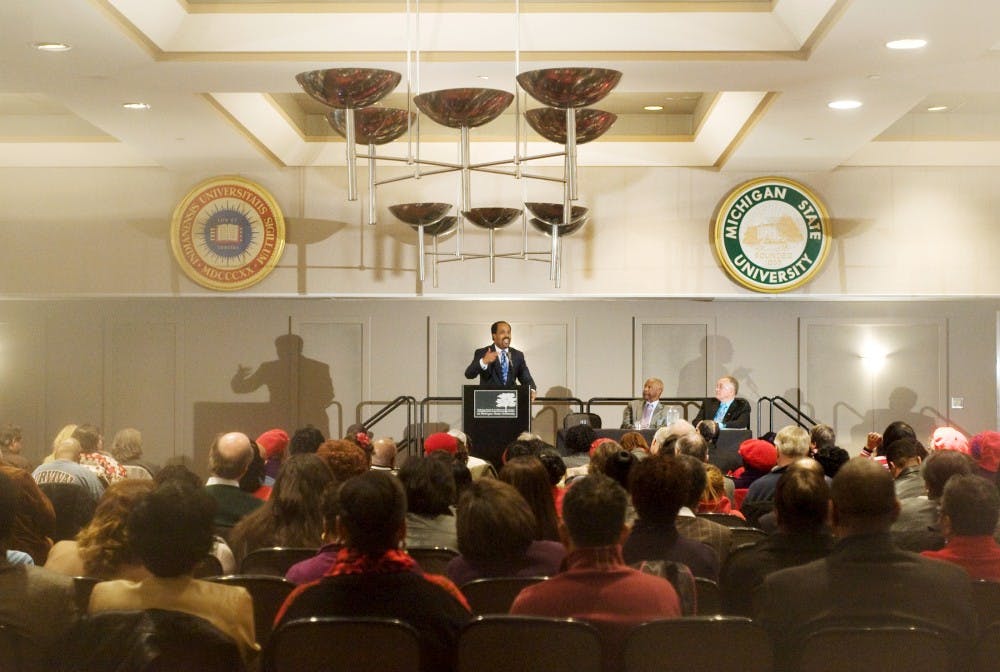Michigan State University’s 22nd annual Dr. William G. Anderson Lecture Series, “Slavery to Freedom,” will kick off Feb. 3 at 5 p.m.
The lecture series aims to engage a diverse audience in dialogue that celebrates the history, heritage, struggles and triumphs of African Americans.
“In 22 years, we have had an array of the nation's foremost thought leaders, politicians, legislators, educators, all of the folks who study, write about, talk about, reflect on, organize and lead freedom movements in this country,” College of Osteopathic Medicine Associate Dean of Diversity and Campus Inclusion Dr. Marita Gilbert said.
This year’s series will feature three speakers — Dr. Yusef Salaam, Brandan “BMike” Odums and LaTosha Brown.
“The messages that our speakers have to share with us are important, because they remind us that the work is still necessary today,” Gilbert said. “They help us to think in different ways and in different areas, topics that we should be thinking about, we should be striving to support.”
Students can register for the virtual lectures by visiting the William G. Anderson Lecture Series page on the College of Osteopathic Medicine’s website.
Dr. Yusef Salaam
Dr. Yusef Salaam will open the lecture series on Feb. 3 at 5 p.m. Salaam is a member of New York City’s Exonerated Five, formerly referred to as the Central Park Five. He was fifteen years old when he was falsely accused and wrongly convicted of rape and assault.
After serving seven years for a crime he didn’t commit, Salaam’s conviction was overturned after a convicted serial rapist and murderer confessed to the original crime. Today, Salaam is a family man, father, activist, poet and inspirational speaker. He uses his platform to share his story and advocate for prison reform.
“I think what I appreciate most about him is that he is still a dreamer,” Gilbert said. “After being wrongfully convicted and incarcerated for years, he's not hardened. He is very, very much a passionate person and he still dreams about what freedom can and should be in this country.”
Brandon “BMike” Odums
On Feb. 17 at 5 p.m., New Orleans-based artist Brandon “BMike” Odums will discuss his efforts to spark national conversation about the use of art in resisting oppression. Odums is best known for his bright full-scale murals that depict historical figures, contemporary creatives and everyday people.
His work “encapsulates the political fervor of a generation of Black American activists who came of age amidst the tenure of the nation’s first Black president, the resurgence of popular interest in law enforcement violence and the emergence of the self-care movement,” according to his website. In addition to being an artist, Odums considers himself to be a mentor and an activist.
“I am excited because I think he invites us to think about freedom movements in the moment and he invites us to think about our own role, our own place in the legacy of other freedom fighters,” Gilbert said. “So, I'm happy for him to share his work with us.”
LaTosha Brown
Finally, LaTosha Brown will close out the lecture series on Feb. 24 at 5 p.m. The co-founder of Black Voters Matter the BVM Capacity Building Institute, Brown will detail her work in ensuring that all human beings have access to quality education, safety, security, peace, love and happiness. She will also discuss how she utilized grassroots organizations to turn Georgia blue in 2020.
“As we are having conversations about the significance of voting rights and that sacred legislation that was passed in our nation's history, there was nobody I thought more appropriate than to come and talk about how we are seeing this significance of voting rights realized in this current moment, socially and politically and culturally,” Gilbert said.
History of the series
The series was started at the College of Osteopathic Medicine and is one of the ways that MSU celebrates Black History Month. It was named in honor of MSU faculty member Dr. William G. Anderson as a tribute to the contributions he has made to the Civil Rights Movement.
At 94 years old, Anderson is still a member of MSU faculty, but he is best known for founding the Albany Movement in the 1960s, for being one of the first Black osteopathic physicians in the country and for being the first African American to have been elected national president of the American Osteopathic Society.
Support student media!
Please consider donating to The State News and help fund the future of journalism.
Discussion
Share and discuss “Michigan State’s 22nd annual 'Slavery to Freedom' lecture series starts” on social media.






